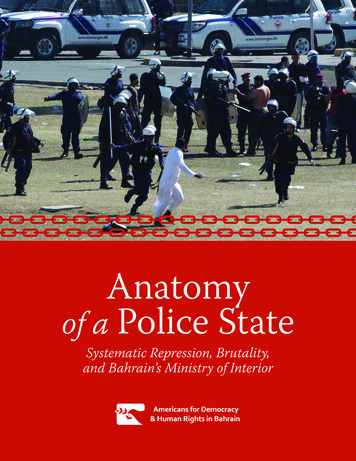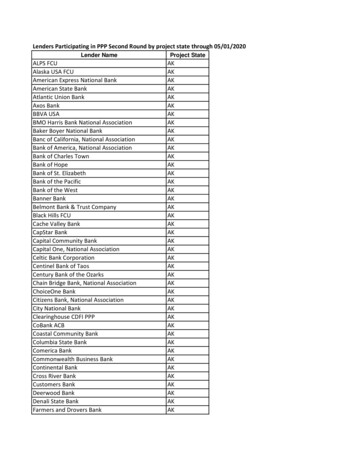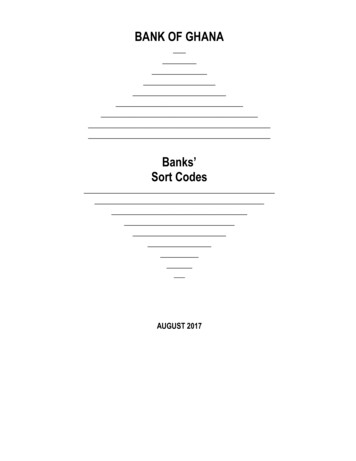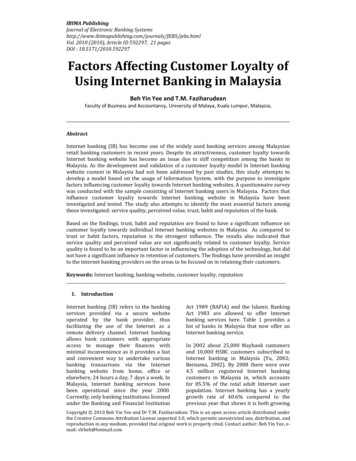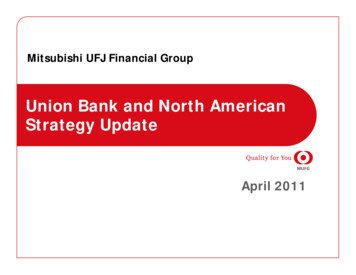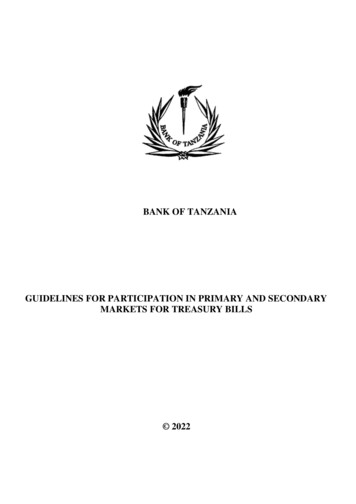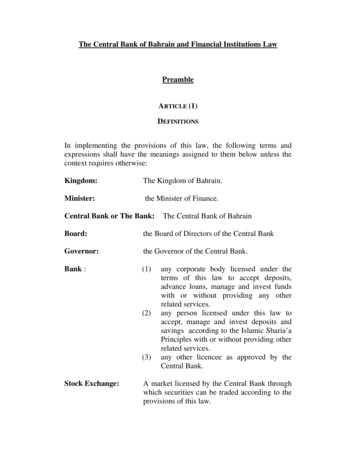
Transcription
The Central Bank of Bahrain and Financial Institutions LawPreambleARTICLE (1)DEFINITIONSIn implementing the provisions of this law, the following terms andexpressions shall have the meanings assigned to them below unless thecontext requires otherwise:Kingdom:The Kingdom of Bahrain.Minister:the Minister of Finance.Central Bank or The Bank:The Central Bank of BahrainBoard:the Board of Directors of the Central BankGovernor:the Governor of the Central Bank.Bank :(1)(2)(3)Stock Exchange:any corporate body licensed under theterms of this law to accept deposits,advance loans, manage and invest fundswith or without providing any otherrelated services.any person licensed under this law toaccept, manage and invest deposits andsavings according to the Islamic Sharia’aPrinciples with or without providing otherrelated services.any other licencee as approved by theCentral Bank.A market licensed by the Central Bank throughwhich securities can be traded according to theprovisions of this law.
-2Bahrain StockExchange:The Bahrain Stock Exchange established byDecree No.4 of 1987.Insurance orReinsuranceCompany:Any company licensed under this law to enterinto and implement insurance, reinsurance,Takaful or re-Takaful contracts.Actuary:Any person specializing in insurancecalculations and is duly accredited by aninternationally recognized authority.InsuranceConsultants:Any person who provides expert consultancyservices in the insurance sector, particularly inthe area of risk management and assessment,and who can valuate the assets and liabilities ofinsurance and reinsurance companies as well asthe rights and liabilities of both the insurer andthe insured.Surveyors andEstimators:Any person, who inspects and estimatesdamages and investigates the causes, determinesthe extent of coverage by the insurance policies,submits proposals to improve the methods ofprotection against risks and preserve the assetssubject of insurance.Insurance Brokers:Any person acting on behalf of the insured ininsurance contracts with insurance companiessubject to the provisions of this law.InsuranceCompanyAgentAny person who acts on behalf of an insurancecompany in marketing its services and dealingwith the insured.Long-termInsurance:means life insurance and fund accumulation.Long term Insurance: Life insurance and insurance associated withdeposit taking projects for specific purposes.Long-term Insurance Insurance companies licensed for long terminsurance services.Companies:
-3InsurancePolicyholder:The person who, in a given time, is the legalholder of an Insurance Policy including anybeneficiary who, under the Insurance Policy, isentitled to a cash payment, a regular payment orany other financial compensation due because ofan accident or if the risk specified in the policyhas occurred.Portfolios andInvestment Funds:Investment schemes offered and marketed in theform of negotiable securities mainly originatedfor the purpose of raising funds from the publicand investing them in specific schemes on thebasis of risk distribution. Shares in such schemesshall be directly or indirectly re-purchased,redeemed or repaid for from the assets of thescheme and according to the interest of theinvestors in any of such scheme.Financial SectorSupport Institutions:These include institutions licenced for operatingclearance houses, settlement of payments,cheques and financial papers, and institutionswhich are wholly or partly set up by financialinstitutions in cooperation with the Central Bankin order to provide services of pure financialnature to the financial services industry.Financial Institutions: Banks, insurance companies, companies dealingin securities, portfolios and investment funds,financingcompanies,moneyexchangecompanies, money brokers and mediators,insurance brokers, mediators of the securitiesmarket, consultancy firms dealing in thefinancial service industry, credit rating firms,Bahrain Securities Market, capital markets, andprecious metals and strategic commoditiesmarkets, financial sector support institutions,including institutions licensed to providefinancial services according to Islamic Sharia’aprinciples.Financial ServicesIndustry:All activities carried out by the financialinstitutions.
-4Transfer ofBusiness:The transfer of all or part of the businessactivities, carried out by any licencee, to otherstogether with any associated rights andliabilities.Deposits:Deposits which are determined by a resolutionto be issued by the Central Bank.Government DebtInstruments:Bonds, warrants, notes and other debtinstruments issued by the Government, itsagencies or by other public bodies, whoseliabilities are guaranteed by the Government.Securities:Shares and bonds issued by shareholdingcompanies, Government debt instruments, andsuch other financial instruments as the CentralBank may approve as securities.-Listing Rules:The rules issued by the Central Bank to regulatethe listing and trading of Securities on the StockExchange.Listed Company:Any company whose securities are listed in theStock Exchange according to Article (86) ofthis law.Loan:Money advanced by a lender to others, to berepaid at a later date, with or without interest.Market Contract:A contract concluded in accordance with theregulations of the Central Bank and Paragraph(a) of Clause (108) of this law.Market Maker:Any person licensed by the Central Bank to selland buy in the Stock Exchange to encouragetrading in this market.Regulated Services:has the meaning set out in Article 39 of thislaw.Netting:means the conversion of a group of claims andobligations of any licencee into one net debit orcredit balance.
-5-Settlement System:Payment System:means a system for the settlement of any party’spayments or obligations arising fromtransactions in cheques and securities.means any system for the settlement of cashpayments or bank transfers between licencees.Licencee:means any person licensed by the Central Bankto provide any of the regulated services.Foreign Authority:means:(a) the authority involved in the regulation ofthe financial service markets in anothercountry.(b) any foreign central bank or body with theauthority of issuing money or responsiblefor supervising payment systems,clearances, or cheques and financialpapers settlement.Person:any natural or corporate person.
-6PART 1CENTRAL BANK OF BAHRAINChapter 1Establishment and Administrationof the Central BankARTICLE (2)ESTABLISHMENT OF THE CENTRAL BANK(a)A public corporate person called the “Central Bank of Bahrain”shall be established in accordance with the provisions of this lawand shall be administratively and financially independent.(b)The Central Bank’s headquarters shall be situated in the city ofManama, and it may open branches in Bahrain and abroad,establish subsidiaries and appoint agents and representatives, bothinside and outside the Kingdom, in order to assist it achieve any ofits objectives stated in this law.(c)The Central Bank shall have an independent budget, to be preparedon a commercial basis, and shall conduct its business according tocommercial banking principles. It shall also perform its dutieswithout being subject to the government administrative andfinancial regulations. The Central Bank shall not be subject to theprovisions of any other law, which imposes prior controls on itsbusiness.The role of the National Audit Court in auditing the activities andaccounts of the Central Bank shall be limited to the audit of theaccounts and the assets of the Central Bank, without anyinterference, in any form, in its activities or policies. The technicalemployee assigned by the National Audit court to audit theaccounts of the Central Bank must be adequately qualified andspecialized in the banking business.(d)
-7-ARTICLE (3)OBJECTIVES OF THE CENTRAL BANKThe Central Bank shall pursue the following objectives within theframework of the general economic policy of the Kingdom in a mannerthat enhances and develops the national economy:(1)set and implement the monetary, credit and other financial sectorpolicies for the Kingdom.(2)provide effective central banking services to the Government andthe financial sector of the Kingdom.(3)develop the financial sector and enhance confidence therein.(4)protect the interests of depositors and the customers of the financialinstitutions, and enhance the Kingdom’s credibility as aninternational financial centre.ARTICLE (4)DUTIES AND POWERS OF THE CENTRAL BANKThe Central Bank shall assume the following duties and powers:(1)issue currency in accordance with the provisions of this law.(2)liaise with the Ministry of Finance and other relevant officialbodies for the purpose of drawing and implementing theappropriate monetary policies to achieve the Kingdom’s generaleconomic goals, maintain the stability of the Bahraini currency andthe monetary system.(3)take appropriate measures to counter adverse local, regional orinternational economic conditions.(4)regulate, develop and license the Services stated in Article 39 ofthis law, and exercise regulatory control over institutions thatprovide such services;
-8-(5)act as banker to the Government within the limits set out in thislaw.(6)advice the Government on issues pertaining to financial andeconomic affairs.(7)manage the Government’s reserves of gold and foreign currency.(8)to act, in coordination with the Ministry of Finance, as the financialagent for the Government at the International Monetary Fund andthe International Bank for Reconstruction and Development as wellas other Arab and international monetary institutions and funds,and perform all Government dealings with these organizations.(9)facilitate and encourage innovation in the financial servicesindustry.(10) safeguard the legitimate interests of licensees’ customers againstthe risks associated with the financial services industry.(11) perform any other duties as stipulated in this law.ARTICLE (5)THE BOARD OF DIRECTORS(a)(b)The Central Bank shall have a Board of Directors formed ofseven members, including a representative of the Ministry ofFinance. Members of the Board shall be appointed by a RoyalDecree for a renewable term of four years. The Decreeappointing the members shall name the Chairman and the Vicechairman of the Board.The remunerations of the Chairman and the members of theBoard shall be determined by a Decree.ARTICLE (6)CONDITIONS OF MEMBERSHIPA member of the Board shall satisfy the following conditions:
-9(1)He shall be a Bahraini national.(2)He shall be entitled to fully exercise his civil and political rights.(3)He shall be experienced in the financial services industry.(4)He shall not have any conviction of a crime involving dishonesty.(5)He shall not be a holder of more than 5% of the capital of, orvoting rights in, any Licencee.(6)He shall not hold a position with any Licencee.(7)He shall not have been declared bankrupt.ARTICLE (7)MEETINGS AND PROCEEDINGS OF THE BOARD(a)The Board shall meet at least four times every year by invitationfrom the Chairman. The Board meeting shall have a quorum of atleast four members, including the Chairman or the Vice Chairman.(b)Resolutions of the Council shall be adopted by an absolutemajority of votes of the members present. In case of a tie, theChairman shall have the casting vote.(c)Any member who has a personal interest in any transaction ofwhich the Central Bank is a party, shall declare such an interest andshall not attend the meeting in which such transaction is discussed.(d)The Board may seek the assistance of experts and shall invite to itsmeetings, for consultation without voting rights, any personswhose opinion it wishes to hear on a particular matter.ARTICLE (8)THE POWERS OF THE BOARDThe Board shall supervise the affairs of the Central Bank, lay down itspolicies and shall exercise all powers necessary to achieve the objectivesof the Central Bank as set out in the provisions of this law.
- 10 -The Board shall, in particular, carry out the following:(1)(2)Draw the Central Bank’s monetary, credit and investment policies,and all other policies relating to the financial sector.Oversee the business of the Central Bank and ensure that all dutiesstipulated in this law are carried out effectively.(3)Determine matters relating to the issue and recall of currency.(4)Approve government borrowing in exceptional circumstancesaccording to the provisions of this law.(5)Approve the annual budget of the Central Bank and anyamendments thereto.(6)Approve the final accounts of the Central Bank.(7)Approve the annual report of the Central Bank’s activity.(8)Issue resolutions and regulations stipulated in this law.(9)Approve the internal regulations of the Central Bank.(10) Approve the financial and administrative regulations regarding theCentral Bank’s personnel. In doing so it shall not adhere to therules of the civil service.(11) Deal with such other matters that may fall within the powers of theBoard under this law.ARTICLE (9)TERMINATION OF BOARD MEMBERSHIP(a)Membership of the Board shall terminate automatically upon theexpiry of its specified term or upon the death or resignation of amember.
- 11 (b)Membership may, upon recommendation of the Board, beterminated, prior to the expiry of the term thereof, if a member:1.2.3.4.has seriously neglected his duties,has violated any of the membership conditions,is no longer capable of performing his duties for any reason.failed to attend three consecutive Board meetings without apermission or an acceptable excuse.ARTICLE (10)GOVERNOR AND DEPUTY GOVERNOR(a)The Central Bank shall have a Governor, of ministerial rank, whoshall be responsible for implementing its policies and assume theday-to-day management of its affairs. The Governor shall bedirectly accountable to the Board, who shall determine his monthlyremunerations.(b)The Central Bank shall have one or more Deputy Governors, ofundersecretary rank, to assist the Governor in the management ofthe Central Bank’s affairs and assume responsibilities on atemporary basis if the Governor is absent or if his position becomesvacant. The Board shall determine the monthly remunerations ofthe Deputy Governor.(c)The Governor is appointed by a Royal Decree for a renewable 5year term of office on the recommendation of the Board.(d)The Deputy Governor shall be appointed by a Royal Decree upon arecommendation of the Board.(e)The Governor shall be the legal representative of the Central Bankbefore the law and others, and shall have the power to sign alldocuments, contract and papers on its behalf. He shall beresponsible for the implementation of this law, the Central Bank’sregulations and the Board’s resolutions.The Governor may delegate, in writing, some of his powers to hisDeputy or other senior staff.(f)The Governor shall assume the duties and powers of the Ministerof Commerce stated in the Legislative Decree No. 3 of 1987 with
- 12 respect to Compulsory Insurance for the Civil Liability of CarAccidents, amended by the Legislative Decree No. 7 of 1996, andsuch powers as stipulated in Article (197) of the CommercialCompanies Law issued by Legislative Decree No. (21) of 2001,regarding the dissolution of the board of directors of licencees.(g)The Governor shall appoint the officials of the Central Bank inaccordance with the financial and administrative regulations relatedto the staff of the Central Bank and shall observe the Bank’srequirements of effective operation.(h)The Governor and the Deputy Governor shall devote their time toworking at the Central Bank. None of them shall, during his tenureof office, be a board member of any licencee or take, with orwithout payment, any position or employment with others.As an exception of the above, the Governor and the DeputyGovernor may participate in committees and boards of directors ofinstitutions and organizations formed or supervised by theGovernment or international financial institutions andorganizations.Chapter 2Capital and General ReserveARTICLE (11)CAPITAL(a)The authorized capital of the Central Bank shall be Bahraini DinarsFive hundred million (BD 500,000,000).(b)The paid up capital of the Central Bank shall be Bahraini DinarsTwo hundred million (BD 200,000,000).(c)The authorized capital and the paid up capital may be increased bya royal decree.(d)The Government shall pay the capital of the Central Bank in fulland shall be the sole owner thereof.
- 13 ARTICLE (12)GENERAL RESERVE(a)The Central Bank shall maintain on its books an accountdesignated as the “General Reserve” which shall be credited withpercentages of its net profits at the end of each financial year in thefollowing order:1.2.3.100% of the Bank’s net profit until the amount of the generalreserve reaches 25% of the authorized capital of the CentralBank.50% of the net profit until the amount of the general reserveis equal to the authorized capital of the Central Bank.25% of the net profit until the amount of the general reserveis double the amount of the authorized capital of the CentralBank.(b)Any net profit remaining after such allocation in accordance withthe preceding paragraph and Article 21 of this law, shall betransferred to the Kingdom’s general account within three monthsof the date of approval of the Bank’s final accounts.(c)The Board may decide at any time to increase the amount of thegeneral reserve over the amount stipulated in this Article.(d)In implementing the rules of this Article and Article (21) of thislaw, the term “Net Profits” means the net profits of the Bank in aspecific financial year according to the approved final accounts.The Board may approve payments from the general reserve at suchtimes and for such purposes as it determines.(e)
- 14 Chapter 3CurrencyARTICLE (13)UNIT OF CURRENCYThe standard unit of currency in the Kingdom is the Bahraini Dinar.The Dinar is divided into 1,000 fils.ARTICLE (14)CURRENCY ISSUE(a)The Central Bank is the exclusive authority to issue currency in theKingdom.No other person shall issue banknotes, coins, bills or warrants,payable to bearer upon demand, that have the appearance ofcurrency or may be interpreted as currency.(b)Currency issued by the Central Bank shall be in suchdenominations, forms, specifications and designs as approved bythe Board and published in the official Gazette.(c)Currency notes issued by the Central Bank shall be legal tender forthe full value thereof. Coins shall be legal tender for their nominalvalue up to five (5) Bahraini Dinars. However, the Bank shallaccept all currencies tendered without limitation.(d)The Central Bank shall reissue and replace currency withoutlevying any fees or commission.
- 15 ARTICLE (15)PRODUCTION OF NOTES AND COINS(a)The Central Bank shall be solely responsible for the printing ofbank notes and minting coins and all matters incidental to theproduction of the Central Bank’s notes and coins.(b)The Central Bank shall make the necessary arrangements for thestorage of stocks of unissued and returned currency, for thesafekeeping of the dies and plates of issued currency and for thedestruction of currency and of dies and plates of currency no longerin circulation.ARTICLE (16)WITHDRAWAL OF CURRENCY FROM CIRCULATION(a)The Central Bank may withdraw any currency it has issued againstpayment of the face value thereof by publishing a notice to thateffect in the Official Gazette and two local daily newspapers, onepublished in English and the other in Arabic language.(b)A notice for withdrawal of currency shall specify the following:1.2.3.The currency to be withdrawn.A period of a minimum of thirty days during which therelevant currency can be surrendered.Any additional conditions regarding such withdrawal.(c)After the end of the Surrender Period any currency to which thenotice applies shall cease to be legal tender.(d)Without prejudice to the preceding paragraph, the Central Bankmay, in a notice published under paragraph (a) of this Article,allow the payment of the face value of such withdrawn currency atits discretion.
- 16 ARTICLE (17)REDEMPTION OF CURRENCY IN CIRCULATION(a)The Central Bank shall redeem currency in circulation withoutlevying any charge or commission.(b)The Central Bank may issue regulations specifying the conditionsfor redemption of damaged, torn or mutilated currency and therecovery of the face value thereof in whole or in part.(c)No person shall have the right to redeem or recover from theCentral Bank the value of lost or stolen currency.
- 17 -Chapter 4Parity-Rate and Foreign ReserveAnd Exchange TransactionsARTICLE (18)PARITY RATE(a)Subject to the obligations of the Kingdom under any internationalagreement of which it is a party, the Board may adopt a resolutionto fix or change the parity-rate of the Bahraini Dinar against anyconvertible currency or any recognized standard of an internationalunit of currency.(b)Any change in the parity-rate of the Bahraini Dinar shall bepublished by the Central Bank in the Official Gazette and in oneEnglish and one Arabic local daily newspaper published in theKingdom.(c)The Central Bank may use whatever means deemed appropriate forthe purpose of maintaining the parity-rate including buying andselling of gold or convertible currencies.ARTICLE (19)FOREIGN RESERVE(a)The Central Bank shall, upon the terms and conditions set by aresolution issued by the Board, maintain a foreign reservecomprised of all or any of the following assets:1.2.3.Currencies and gold bullion.Foreign convertible currencies, or balances of convertiblecurrencies in foreign banks.Any internationally recognized assets including the gold partof the Kingdom’s share in the International Monetary Fundand the Special Drawing Rights allocated to the Kingdom inthe International Monetary Fund;
- 18 4.5.6.7.8.Bills of Exchange and Promissory Notes payable outside theKingdom in convertible currencies;Treasury Notes issued by foreign governments and payablein convertible currenciesBonds specified by the Board, issued or guaranteed byforeign governments or international financial institutions,provided that they are payable in convertible currencies.Other Bonds as the Board shall determine, issued by aforeign entity provided that they are negotiable ininternational financial markets and payable in convertiblecurrencies.Any other assets valuated in foreign currencies approved bythe Board.(b)The amount of foreign exchange reserve permanently maintainedby the Central Bank shall not be less than 100% of the value of thecurrency in circulation.(c)In exceptional circumstances, the minimum amount of the ForeignExchange Reserve may be changed by a resolution issued by theBoard, provided that such minimum shall not be less than 75% ofthe value of the currency in circulation.ARTICLE (20)FOREIGN EXCHANGE TRANSACTIONS(a)The Central Bank may buy, sell and deal in gold coins and bullion,foreign currencies, treasury notes and other bonds and to open andmaintain accounts abroad, and to act as an agent or correspondentfor foreign central banks or similar institutions as well as forforeign governments and international financial institutions.(b)The Central Bank shall carry out any of the transactions referred toin the preceding paragraph in accordance with such terms andconditions as the Board may determine.
- 19 -ARTICLE (21)CONTINGENCY RESERVE(a)A percentage of the net profits of the Central Bank determined bythe Board shall be credited at the end of each financial year to aspecial account to be entitled the “Contingency Reserve”.(b)The sums standing in the credit of the Contingency Reserve can beused for such purposes that serve the objectives of the CentralBank as determined by the Board from time to time.ARTICLE (22)REVALUATION RESERVE(a)All profits resulting from the revaluation of the Central Bank’sassets or liabilities in gold or foreign currencies as a result of anychange in the parity-rate of the Bahraini Dinar or the rate ofexchange of the Central Bank’s assets of such currencies, shall beentered in a special account to be entitled “Revaluation ReserveAccount”.(b)Losses resulting from any change in the value of the CentralBank’s assets or liabilities of gold or foreign currencies shall becovered from the credit balance of the Revaluation ReserveAccount. If such balance is insufficient to cover such losses, theGovernment may issue bonds in favour of the Central Bank for thevalue of the deficit and such bonds shall be interest-free and nontransferable.(c)The Central Bank shall use any credit balance in the RevaluationReserve Account at the end of each financial year to redeem anybonds it has issued in accordance with the provisions of thepreceding paragraph.(d)The revaluation under this Article shall be carried out at least onceevery year at such time as the Board may determine.
- 20 (e)Any entries in the assets or liabilities of the Revaluation Accountshall only be made in accordance with this Article.Chapter 5Relations with the Government andInternational Monetary InstitutionsARTICLE (23)FINANCIAL AGENT OF THE GOVERNMENT(a)The Central Bank shall be the banker to the Government and shallact as its financial agent. It is the place where the governmentdeposits its funds.(b)The Central Bank may provide the services referred to in theprevious paragraph to Government organizations and agencies andother public bodies.(c)As an exception from the provisions of paragraph (a) of thisArticle, the Government may open and maintain accounts with anycommercial bank and utilize the services of such banks under suchterms and conditions as shall be agreed upon between the Ministerand the Central Bank.(d)The Central Bank shall receive and disburse government funds andshall keep the relevant accounts without collecting any charges orinterest for such services. The Central Bank shall not pay anyinterest on the Bahraini Dinars credit balances of the Government.ARTICLE (24)ADMINISTRATION OF NATIONAL DEBT(a)The Central Bank shall, in consultation with the Minister,administer the National Debt through any of the following means:1.2.Procedures for the issue of Government Debt Instruments.Redemption of Government Debt Instruments in accordancewith the terms thereof.
- 21 3.Interest LE (25)LOANS TO GOVERNMENT(a)The Central Bank may advance loans to the government inexceptional circumstances to cover any seasonal or unforeseendeficit in the National Budget or to provide liquidity inemergencies on the following conditions:1.2.3.(b)Loans advanced to the government shall be repaid withinthree months immediately following the end of the fiscalyear during which such loans were granted.The aggregate of loans shall not exceed 25% of the approvedNational Budget of the Kingdom for the fiscal year duringwhich such loans were granted.Loans shall be made on such terms and conditions as theBoard may determine.The Central Bank may, subject to the Minister’s approval, grantloans and credit facilities to government agencies or public bodieson the terms and conditions stipulated in the preceding paragraph.ARTICLE (26)PUBLIC DEBT INSTRUMENTS TRANSACTIONSThe Central Bank may buy, sell and deal in government debt instrumentsoffered for public subscription if such instruments are not fullysubscribed.ARTICLE (27)RELATIONS WITH INTERNATIONAL FINANCIAL INSTITUTIONSThe Central Bank shall be the financial agent, custodian and agencythrough which all the operations with the international financialinstitutions, of which the Kingdom is a member, shall be transacted.
- 22 ARTICLE (28)TAX AND FEES EXEMPTIONThe Central Bank’s capital, property, transactions and profits shall beexempt from all taxes and fees.Chapter 6Central Bank’s Transactions and InvestmentsARTICLE (29)PERMITTED TRANSACTIONS(a)The Central Bank may carry out any of the following transactionswith financial institutions:1.2.3.4.5.6.(b)Buy, sell, discount and re-discount bills of exchange andpromissory notes.Buy, sell and otherwise in the government debt instruments.Buy, sell and otherwise deal in the assets mentioned inArticle 19 (a) of this law.Grant credit facilities in the ordinary course of business andalso the exceptional circumstances for the purpose ofassisting financial institutions overcome any serious shortageof liquid money or any risk to their financial situation.Borrow money or any other assets.Open and maintain accounts for financial institutions andaccept their deposits upon the terms and conditions to bedetermined by the Governor.The Central Bank may perform the following:1.2.Act as agent or correspondent bank for foreign central banks,similar monetary institutions, foreign governments or theirbodies or international financial institutions.Open accounts to any other person, except those mentionedin the preceding item, upon the approval of the Board inorder to encourage participating in the financial activity ofthe Bank.
- 23 -3.4.Extend loans to its employees upon the terms and conditionsstated in the regulations issued by the BoardDo all such other acts that are ancillary, incidental orconsequential to any of the transactions mentioned in thisArticle and as determined by the Central Bank.ARTICLE (30)INVESTMENTSThe Central Bank shall invest its capital and reserves according to theasset investment policies set by the Board.The Central Bank may appoint one or more fund managers to administerits investments.ARTICLE (31)PROHIBITED TRANSACTIONSExcept as otherwise provided for in this law, the Central Bank shall not:(1)Engage in trade or participate in any financial, commercial,agricultural, industrial or other undertaking except for suchactivities as the Central Bank may deem necessary to achieve itsobjectives.(2)Purchase, or retain title to, real estate except for the conduct of theCentral Bank’s business and for the housing of its employees.(3)Advance unsecured loans.(4)Advance loans upon security other than that provided for under thislaw. However, if the ability of a debtor to repay any debt due to theCentral Bank is doubtful, the Centr
(1) set and implement the monetary, credit and other financial sector policies for the Kingdom. (2) provide effective central banking services to the Government and the financial sector of the Kingdom. (3) develop the financial sector and enhance confidence therein. (4) protect the interests of depositors and the customers of the financial




